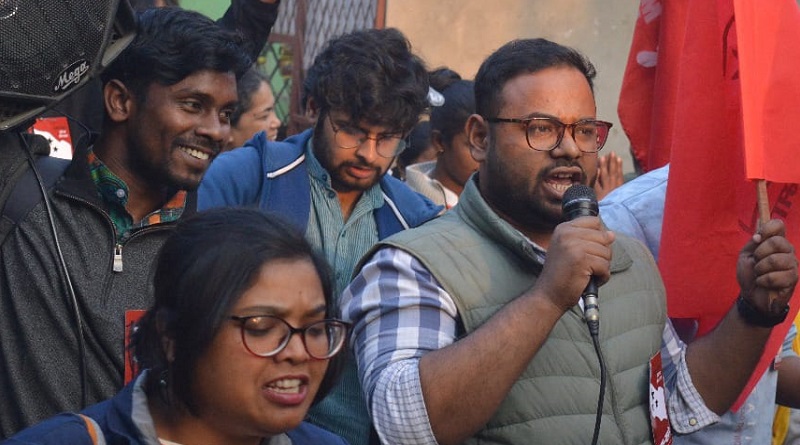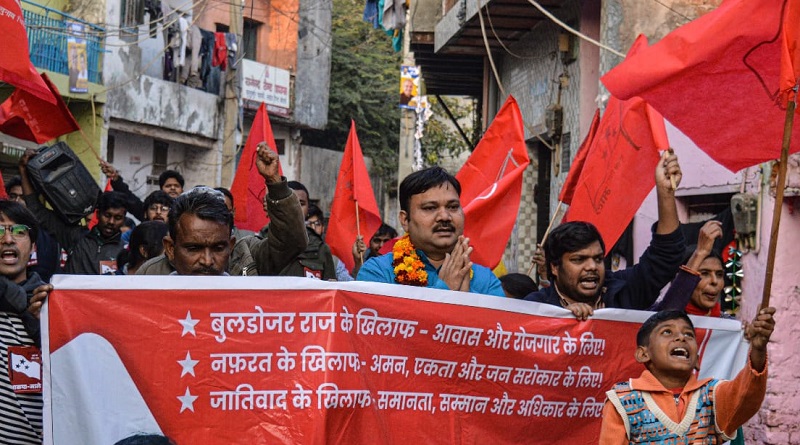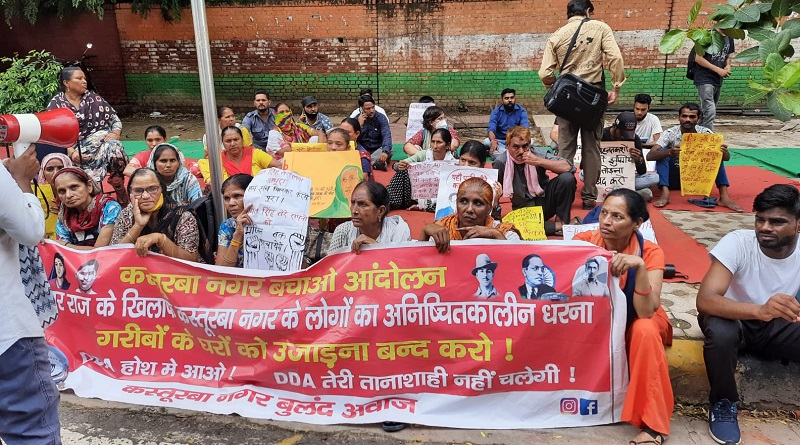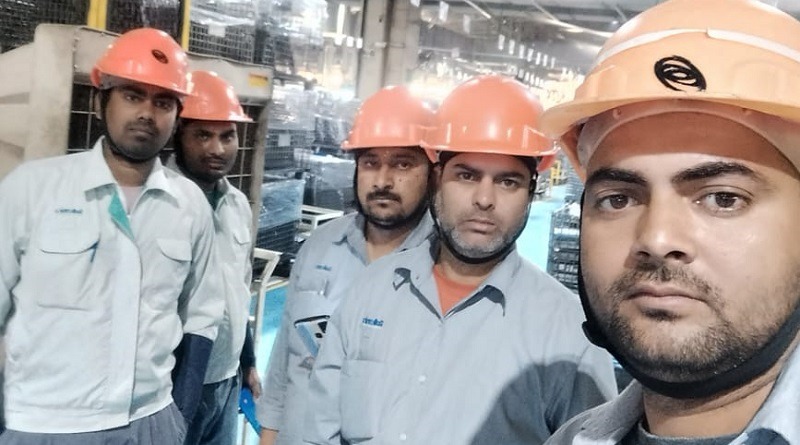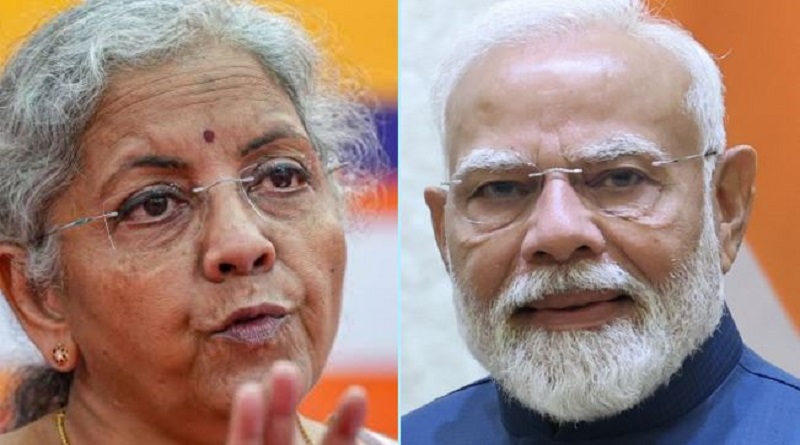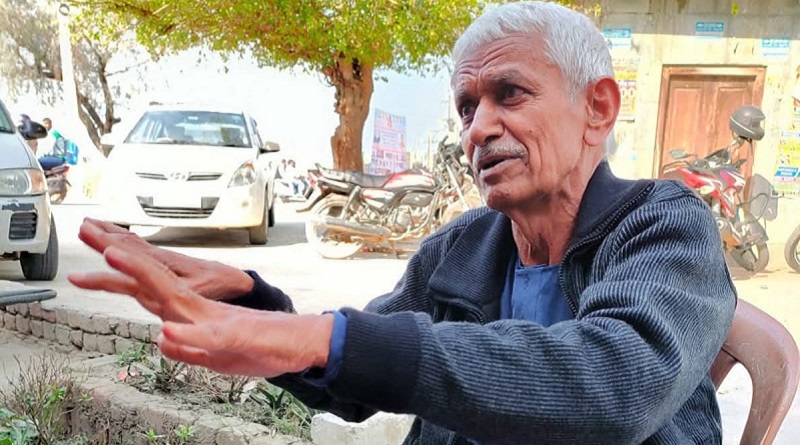MCD Elections and the Working-Class Question: Experiences from Lado Sarai
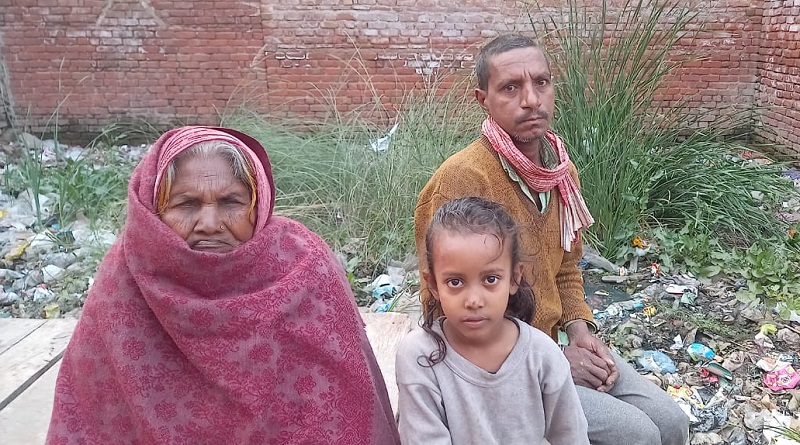
By Akash Bhattacharya
One can hardly explain the rise of the Bhartiya Janata Party (BJP) to its current position of pre-eminence without accounting for its alliance with capital. The massive power wielded by the Adani and the Ambani groups is just the tip of the iceberg.
The regime is ceding enormous amounts of power to corporates of all colours and hues, as seen in policy measures such as the farm laws (withdrawn, at least for now) and the National Education Policy.
Ascendancy of capital is only possible by compromising the interests of workers: the labours codes are the most obvious expression of this compromise. Under such circumstances, working class politics against exploitation, for justice and equality, automatically become integral to the efforts to defeat communal-corporate rule.
Capital tends to back whoever is willing to represent its class interests. In that sense, the alliance between Hindutva and capital may seem opportunistic.
After all, the Rastriya Swayamsevak Sangh (RSS) has a history of opposing liberalisation of the economy, of course because of deeply conservative social and cultural attitudes rather than out of socialist inclinations.
However, in the course of the Vajpayee regime at the union level (1998-2004) and the Modi regime in Gujarat (2001-2014), the pro-liberalisation sections gained ascendancy within the saffron camp.
The RSS has never had a clear economic politics. It has always championed a xenophobic cultural nationalism as its key political plank and has moulded its economic thought according to the emerging situation.
The Hindutva-capital alliance started was opportunistic when it started. However, as the partnership has developed, the RSS with its caste-based belief system, and capital with its class interests, have discovered that they share a lot in common.
Beating the working class to the ground (through labour codes and the covid genocide), not creating enough jobs, replacing public systems with corporate philanthropy, and subverting a rights-based citizenship ethic in favour of conservative duty-oriented attitudes, are part of a concerted attempt to create a politically divided, docile, and socially regressive work force.
This status quo can hardly be challenged without a strong working-class politics which is also well integrated with the emerging horizons of new democratic politics.
Elections as a Site of Class Politics
Working class politics at its sharpest leaves its mark across society: workplaces, homes, neighbourhoods, industrial areas, towns, cities, villages, institutions, and government. At present there is lack of a strong working-class voice within elected governments.
With large number of workers unable to vote due to their migratory nature, there is a big question mark over the nature of workers’ participation in the electoral process.
In the recently concluded MCD elections, CPI-ML (Liberation) looked for a way to address this gap –at a local scale – by fielding worker leaders as its candidates in four of the five wards where it contested. In South Delhi, the party made its debut at Lado Sarai, in addition to contesting again from Sangam Vihar.
At the Lado Sarai ward, the party fielded Mr. Jitender Kumar – a contractual sanitation worker from JNU and an active member of the contract workers’ union affiliated to the All-India Central Council of Trade Unions (AICCTU) –– as its candidate.
JNU is known as a premier academic institute, but it took a series of powerful workers’ movements since 2008 to ensure minimum wage and social security benefits for the contract workers on campus.
Till date, the workers are not paid regularly and randomly transferred between departments in order to prevent collectivization at worksites.
Women workers, who usually finish their morning chores at home before coming for work, were recently given morning duty. Workers face regular harassment of this kind from the administration, ostensibly as retaliation against a strong student-workers’ united voice on campus.
The Lado Sarai ward includes JNU as well as working class residential areas such as Kusumpur Pahari and Motilal Nehru Camp. It also includes lower middle-class localities in Ber Sarai, Katwaria Sarai and parts of Lado Sarai as well as elite residential areas of Vasant Kunj and Saket which are dotted with small temporary residential sheds (called jhuggis in local parlance).
The campaign team reached out to all the working-class colonies that fall within the ward. Mr. Kumar’s campaign talked about the need for union activities across Delhi, especially among sanitation and other municipal workers. It also brought up AICCTU’s track record of campaigning for workers’ rights, to emphasize the fact that the party is more of a around the year fighting force and not a one-dimensional election focused party.
Challenges and Barriers
For our working-class candidates with little personal resources, contesting elections in a meaningful manner was a challenge. The nomination forms asked for a range of paper documents. Many would consider these documents to be basic: date of birth certificate, bank details, documents certifying even minimal forms of property ownership (land, house, jewellery etc.) However, India’s poor is also document poor. This issue had come up sharply during the country-wide protests against the National Register of Citizens (NRC). It has also been highlighted in campaigns against making Aadhar mandatory.
The candidate required ten proposers. Each proposer, as well as the candidate, had to fill a form and then travel in person to a designated office a few kilometres away to collect a Certified Voter Copy. Only then s/he became eligible to propose a candidate or contest the election. With contractors threatening to throw workers out of jobs for minimal absence, most workers wondered if they could risk this visit.
The campaign team found a way to make sure that Mr. Kumar did not miss duty even once during the nomination process and during the campaign. He joined the campaign after the duty hours. Yet, within a week of filing the nomination, the contractor under whom he worked – Rakshak– issued him a show cause notice for contesting the election.
The notice claimed that any involvement in elections went against Rakshak’s code of conduct which was binding on its employees.
When pressurized to explain such a blatantly illegal and unconstitutional move, Rakshak failed to produce any pertinent clause in their code of conduct and indicated that the notice had been issued at the behest of the university administration. The notice meant that Mr. Kumar could be suspended form work withing three days and eventually retrenched.
The campaign team immediately issued a response threatening legal action against Rakshak and appealed to the RO to take immediate action against the agency for going beyond their jurisdiction and challenging a nomination which had been approved by the RO. Notably, the model code of conduct issued by the Election Commission mandates a no-objection certificate from the employer if the candidate is employed by the government. No such requirements exist in case of private contractual employment.
The intervention by the campaign team led to the prompt withdrawal of the show cause notice. Mr. Kumar was able to contest as a CPI-ML candidate, but a question came up sharply: if it is so difficult for contract workers to participate in the election process as anything other than voters, are they mere vote banks? This question was in turn put to the voters during the campaign.
- Havoc wreaked by NPAs: Why corporate loans are turning more to NPA?
- TUCI demands repeal of 4 labour codes, 3 day dharna at Jantar Mantar concludes
Campaign and Response
The campaign focussed first of all, on the need to keep the BJP out. However, when the question of alternatives came up, the CPI-ML cadres were able to highlight the limitations of the Aam Aadmi Party (AAP). The fact that the candidate was a sanitation worker, for whom the broom is an everyday reality and not a mere election symbol, struck a chord in sanitation workers’ colonies in Vasant Vihar and Munirka.
Sanitation workers form a key part of India’s workforce. Majority of them work on contract, with no social security. Most of them are Dalits. They live in the midst of enormous precarity and lack of dignity. AAP has been promising to make sanitation workers permanent but has so far reneged on the promise. AAP has also been silent on the bulldozing of houses and has not installed clean tap water in workers’ colonies. The regular visit of water tankers is an improvement indeed, but a local water mafia has grown around them causing much inconvenience to people.
In large working-class localities such as Kusumpur Pahari, where workers do not have access to tap water, sewer lines, and where residents have not been granted land rights despite living there for generations, CPI-ML strongly supported these demands.
In the process, the party brought up the need for an organization which represents workers’ interests to claim their space within electoral politics. This brought the party in direct conflict with the AAP in working class localities, where there was already a significant anger against the ruling BJP due to price rise, unemployment, and fall in living standards.
There was also genuine concern about the possibilities of demolition of working-class colonies if the BJP were to be empowered again in the municipality. CPI-ML highlighted the issue of slum demolition to emphasize on the need to vote out the BJP. Comrades from Dhobi Ghat (near Jamia Milia Islamia) whose houses were bulldozed last year joined the campaign in Lado Sarai.
The positive reception of the campaign among Dalits and the working people in the ward was not quite reflected in the vote share.
The use of money power and alcohol to influence voters was rampant. Voters also sensed that the AAP was a more “winnable” alternative to the BJP at present. The campaign however helped build a Left presence among the masses in this area, which is essential for continuing the twin tasks of defeating fascism and building a new democratic alternative.
(Writer is Political Activist and member of AICCTU.)
Subscribe to support Workers Unity – Click Here
(Workers can follow Unity’s Facebook, Twitter and YouTube. Click here to subscribe to the Telegram channel. Download the app for easy and direct reading on mobile.)
